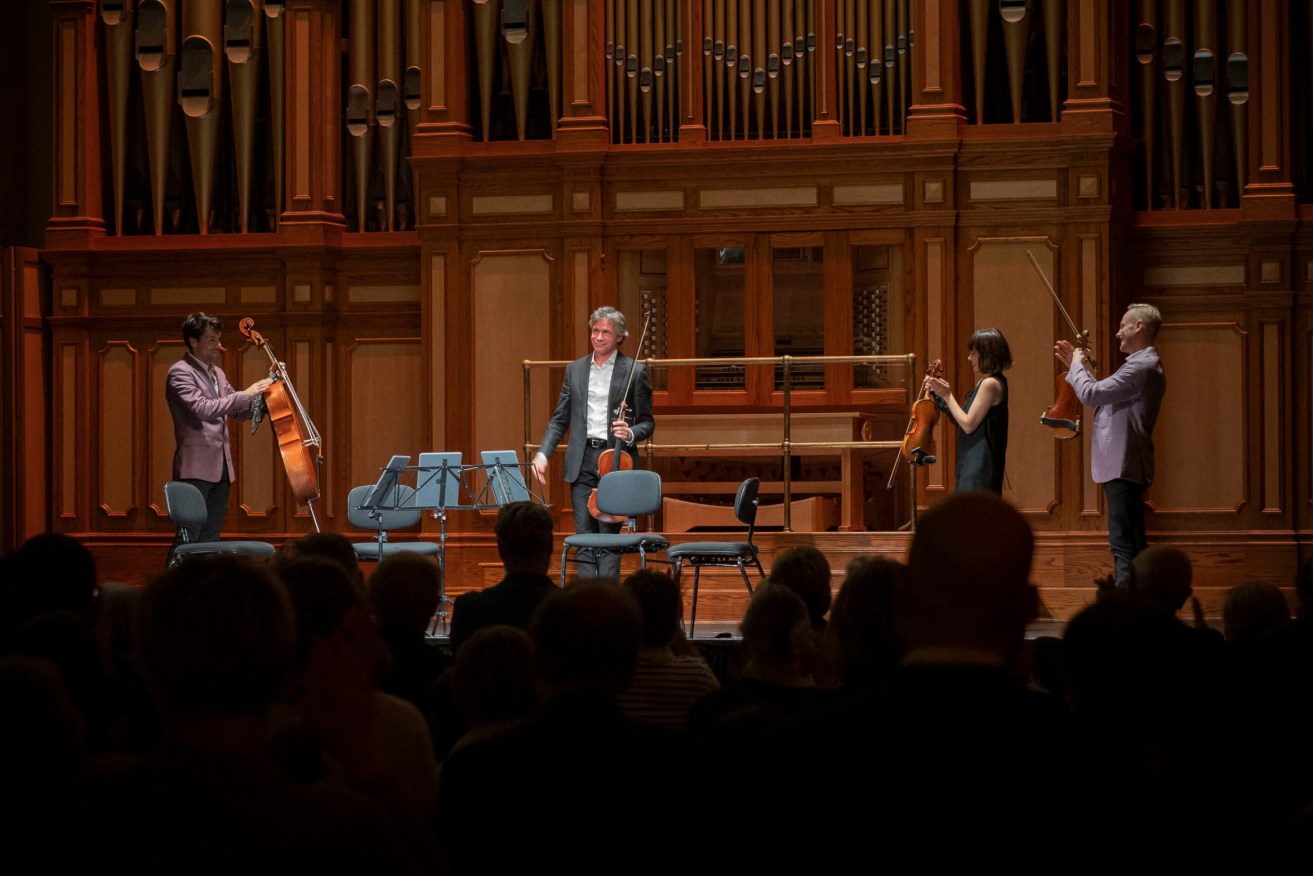Music review: ASQ In Concert – Bartók, Mendelssohn, Fischer
The ASQ’s first concert since lockdown gave audiences a chance to see its new cellist, Michael Dahlenburg, in action and ponder what life for the quartet will be like once Stephen King leaves as violist.


An ovation for long-standing ASQ violist Stephen King at the end of last night's concert. Photo: Sam Jozeps/ASQ
The turnstiles are moving again at the Australian String Quartet. It is sad to see the group’s longest-standing member, viola player Stephen King, saying goodbye. We’ll have to wait to see who replaces him, but his decision to step away from playing follows Sharon Grigoryan’s departure in November 2020 and the signing on of replacement, Michael Dahlenburg.
It’s changing times for sure for the group, and its first concert for the year, titled ‘Bartók, Mendelssohn, Fischer’, was momentous for several reasons.
As well as being Dahlenburg’s debut and King’s swan song, this was the quartet’s return concert after a 12-month absence from the stage due to COVID.
Right from the hushed opening of Bartók’s String Quartet No 3, one could see how the ASQ has emerged from this long interval as a changed ensemble. Dahlenburg naturally brings with him a distinct musical personality: intense and interior of mind, he is a discreet musician whose carefully moulded sound fits in with keen responsiveness and hand-in-glove intimacy to what his colleagues are doing.
But this Bartók was special at every level. It as if the whole group had decided, on account of their new young player, to hold back from any overt ostentation, contain their dynamics, and look more inwardly into the music. In what amounted to a genuine reassessment of this quartet as opposed merely to an interpretation, they found layers of texture and energy in its close counterpoint that felt not so much like four separate players but a single life-affirming voice.
To hear Bartók played this way was excitingly new.
In Mendelssohn’s String Quartet No. 1 they likewise held a lot in reserve and presented a finely honed, organic coalescence of voices. A product of Felix’s childlike world, this work – like all of the composer’s six quartets – can sound trivial if played in a sentimental manner, but the ASQ steered right away from that. Here again was an essay in modernism, not nostalgia, but one lovingly executed.
In the second movement, there is a delightfully simple ‘canzonetta’ that can sound stodgy if forced and overplayed. Instead of that, they gave it an ineffable lightness. Mendelssohn pairs off the players in lightning quick flurries of action, and to hear Dahlenburg do so with King was just wonderful. His deft, silkily smooth run of semiquavers signals a new sonic angle for the ASQ that we can probably expect to hear more of in the future.
It is not often that a new work competes for attention in a program of classic staples but with Czech composer Pavel Fischer’s String Quartet No. 3 Mad Piper, this became distinctly the case. It is so-named after a Scottish highland piper named Bill Millin who led a company of soldiers into battle at Normandy. Millin reputedly escaped fire because the Germans thought he was mad. Fischer draws on this legend while incorporating elements of Balkan folk fiddling.
It is a highly enjoyable work and the ASQ clearly adore this new classic of the quartet genre. In the first movement’s bagpipe-like sounds, their playing was sinewy and sonorous and their gypsy fiddling that followed was pure rapacious fun and simply brilliant.
King’s beautifully inflected, soulful solo in the third movement was deeply moving and one of his finest moments.
This articulate and highly intelligent musician will be truly missed by audiences, but it is good to know that he will be staying on as the quartet’s new director of learning and engagement later in the year.
Thank you Stephen King.
Meanwhile, with violinists Dale Barltrop and Francesca Hiew, and now with Dahlenburg on board, the group’s future could not look stronger.
This concert was at the Adelaide Town Hall on May 24.




